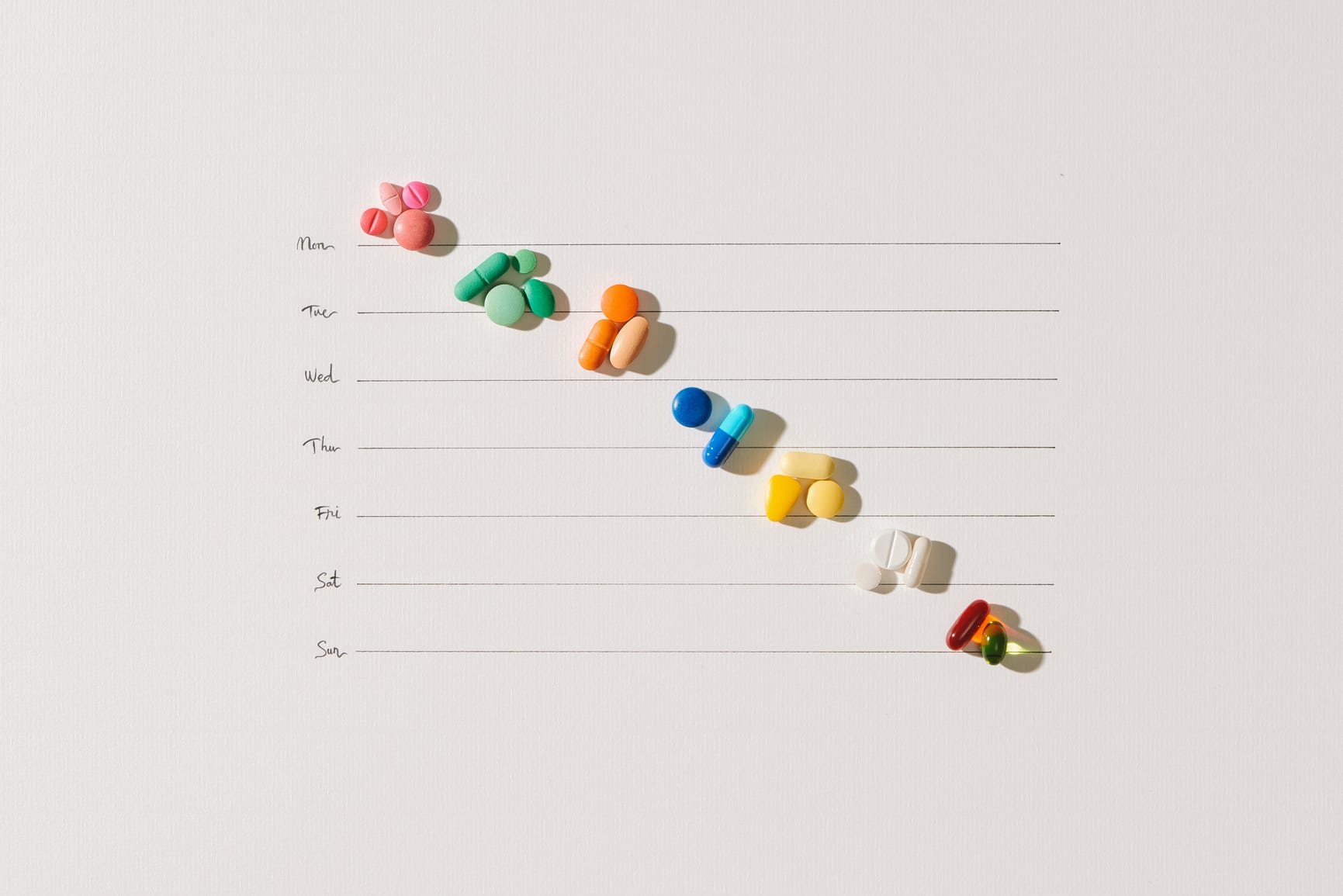In the span of a year, protecting your immune health has gone from something you’re vaguely aware you should do (in the same way you know you should really trying getting more sleep and drinking more water) to something that feels vitally important every waking moment of your day. It may have taken a pandemic, but your body’s defense system is finally getting its due.
So how can you keep your immune system strong in the face of viruses (and an ongoing flu season)? And how can supplements help you boost your immune health? We have the answers.
How to keep your immune system healthy
The human body is exposed to millions of germs every day. What prevents you from getting sick is the complex network of cells, tissues and organs that make up your immune system. This includes your skin (all the more reason to keep it healthy with strong barrier function!), white blood cells, organs, lymphatic system, and bone marrow.

Vaccines are the only way to provide immunity against a specific disease (like the coronavirus) but there are other ways you can generally keep your immune system in good health. “An individual will be more susceptible to disease when sleep deprived or under tremendous stress,” says Dr. Jeffrey Egler, MD, a board-certified family medicine practitioner with Parsley Health and Chief Scientific Advisor at GEM, a vitamin company that’s made with real foods. So consider this your reminder to actually get more sleep this week and prioritize the things that make you feel more Zen.

The third pillar of immune health which you can control is nutrition. “The quality of one’s nutrition and immune function are directly related and proportional. Poor diet, poor immune function,” says Dr. Egler. “Assuring that a nutrition plan meets the unique needs of an individual is foundational in establishing optimal immunity.”
The best diet to keep your immune system strong involves “eating real, whole foods rich in nutrients,” says Dr. Egler. “Eating nutrient-packed whole foods allows better absorption and synergy in the effects between the nutrients rather than relying on supplementing independent ingredients.” (Bonus points for a diverse plate filled with organic, plant-based foods, he adds.) Think: citrus fruits bursting with vitamin C, raw or steamed broccoli packed with antioxidants, yogurt rich with defense-boosting vitamin D, and red bell peppers which help your body produce skin-loving vitamin A.
But even the healthiest eating plans can benefit from some extra help from supplements. “Even in the best of diets, not all the nutrients needed are properly absorbed or consistently delivered depending upon the diversity and consistency of foods,” Dr. Egler explains. “Supplements and vitamins can help to assure that nutrient delivery is consistent while providing adequate levels to better assure proper absorption and assimilation into the body system.”
Immune-Boosting Supplements to Know
It’s important to note that there is currently no research suggesting any supplement can protect against COVID-19. But supplements can help you fight other cold viruses. “Good quality supplementation — when prescribed appropriately and specifically to the needs of an individual — can help to assure that there are no critical gaps or deficits in vital nutrients,” Dr. Egler says.
Emphasis on appropriately prescribed for your individual needs. You should never start taking a new supplement without consulting your healthcare provider first, since the specifics of your diet, lifestyle, medications you’re taking, and any underlying conditions can matter. Adding a vitamin C gummy to your morning, for example, is a very low risk since vitamin C is a water-soluble vitamin, meaning anything your body doesn’t need will filter out in your pee. But zinc can interfere with the effectiveness of antibiotics, so if you’re taking them for any reason, you’d want to avoid this supplement.
The second thing to know before taking any supplements is that “not all supplements are created equally,” Dr. Egler says. Vitamins and other dietary supplements aren’t regulated by the Food and Drug Administration (or any other official supervising body) which “means that the products and their ingredients are not necessarily tested for quality or the appropriate or advertised quantities,” Dr. Egler explains. “The quality and amount of the ingredients present are essential to their function and effectiveness as well as their safety. But in an unregulated and untested market, there is really no way to know.” Unregulated supplements can also be contaminated with harmful substances.
In other words, the supplement industry is kind of like the Wild West — plenty of good guys, but also some real bad actors to be aware of.
Before you buy any supplements, Dr. Egler recommends investing in pharmaceutical grade products, which typically have third-party agencies or regulators who evaluate their products and issue a report card that details the quality and quantity of nutrients found in each dose. You might see “pharmaceutical grade compounds” or “PCGs” on the bottle or the brand’s website. You can also look for the seals of the USP (United States Pharmacopeia) and cGMP (Current Good Manufacturing Practices), Dr. Egler says.
You won’t typically find these high-grade supplements on drugstore shelves but they can be easily prescribed by your doctor. “It’s important to find a provider that really invests themselves in understanding these concepts and understanding you and your nutritional and supplementation needs as an individual,” Dr. Egler says.
So now that you know how to expertly source supplements, which one’s should you be taking to support your immune system? Here are our favorites.
Vitamin C
When you get sick, vitamin C can help you fight the infection. “It helps to protect you from infection by stimulating the formulation of antibodies and thereby boosting immunity,” Dr. Egler explains.
The recommended daily amount (RDA) of vitamin C is 65 to 90 mg for adults.
Vitamin D
“Vitamin D is essential to the healthy functioning of the immune system as it also helps the body to produce antibodies,” Dr. Egler says. It can even help prevent colds. Low vitamin D levels are very common in North America (especially during winter), which can make you more susceptible to infections, so a supplement can help boost your levels.
The RDA of vitamin D is 600 IUs (international units) for adults.
Zinc
“Zinc helps the immune system work properly and is important in wound healing and recovery from illness,” Dr. Egler says. It can also help reduce the duration of a cold.
The RDA of zinc is 8 mg for adult women and 11 mg for adult men.
Propolis
Propolis, a compound produced by bees, is getting a lot of wellness buzz recently. For good reason: “There is some evidence that propolis might be helpful for treating the common cold and other upper respiratory tract infections,” says Dr. Egler. But the verdict on taking propolis as a supplement is still out, he adds. “Better evidence seems to suggest usefulness in applying propolis-containing ointments or creams to improve the healing and symptoms of cold sores.”
More research is needed on the optimal amount of this supplement.
B vitamins
There are several different types of B vitamins: B1 (thiamine), B2 (riboflavin), B3 (niacin), B5, B6, B7 (biotin), B9 (folate) and B12. “Each has its own unique contribution to your overall well-being affecting everything from heart and brain health to promoting the health of your skin, hair and nails,” says Dr. Egler. “Together they help to stimulate the metabolic functions and are catalysts to the chemical reactions that are essential to immune system function.”
The RDA for each B vitamin varies — talk to your doctor about the optimal amount.
Echinacea
“Perhaps the most widely used Western herb for immune-enhancement, echinacea compounds have been found to boost production of immune chemicals that stimulate macrophages, the white blood cells that track down and engulf microbial invaders,” says Dr. Egler. And research shows that taking echinacea proactively may help prevent upper respiratory infections like the common cold.
There’s no standard dose of echinacea so talk to your doctor about what your needs are before adding to your diet.
We only recommend products we have independently researched, tested, and loved. If you purchase a product found through our links, Sunday Edit may earn an affiliate commission.









